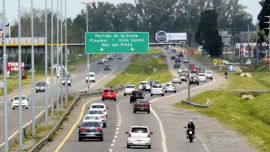Continuing the trend of recent years, 2022 has seen vast swathes of Argentina’s forests, fields and wetlands completely destroyed by wildfires, often precipitating thick blankets of smog throughout the Central Region.
According to figures provided by the National Fire Management Service, the nation’s 23 provinces have reported 2,300 wildfires since January, accounting for more than 600,000 hectares of destruction — up from 330,000 hectares in all of 2021. And the problem is probably worse than that. A spokesperson from the Environment Ministry confirmed to the Times that these satellite-confirmed figures likely account for only a fraction of the true area burned, with some ground-based survey estimates landing in the millions of hectares. As more smoke is produced, satellites become less effective in tracking outbreaks.
Cities in the Paraná Delta have been especially affected by this year’s fires. Throughout much of August, clouds of smoke from blazes in Santa Fe and Entre Ríos hung over the city of Rosario, significantly decreasing visibility and causing many locals to struggle breathing – consequences that were also felt over 300 kilometres southeast in the nation’s capital. And while natural factors like lightning strikes, drought and prevailing winds have undoubtedly exacerbated the problem, it is clear to authorities that many of the fires are started intentionally in order to enhance agricultural productivity and to clear land for real-estate developments.
For example, researchers from the Scalabrini Ortiz Study Center estimate that 95 percent of wildfires in the northern province of Corrientes are directly caused by humans.
Wetlands law
One of the most widely supported solutions to the wildfire issue is the implementation of a ‘Ley de Humedales’, or Wetlands Law, which would establish conservational zoning requirements preventing environmentally destructive practices, while also bolstering the budget of government agencies ensuring compliance.
However, the bill has been stalled in Congress for nearly a decade. As a result of the bill’s potential regulatory impact on over a fifth of Argentina’s land, it has failed to gain sufficient bipartisan support from national deputies in the lower chamber, with industrial interests and provincial governments effectively lobbying political parties on both sides of “la grieta.”
“Strong corporate interests converge here to privilege a productive economic model which massively destroys our ecosystems while some businessmen fatten their pockets and socialise the cost of the environmental liabilities generated,” Rafael Colombo, an environmental lawyer and professor at the Catholic University of Santa Fe, told the Times.
“The opposition to the bill is explained by an environmental illiteracy which comes from a lack of serious and committed study,” he added. “But above all, there are oppositions holding serious conflicts of interest, with deputies whose surnames represent the interests of soybean agribusiness, intensive cattle-rearing, large real-estate developments and mineral extraction projects.”
Both the Argentine Agrarian Federation (FAA) and the Argentine Rural Confederations (CRA) have spoken out against the need for a Wetlands Law, as have members of the mining industry. They insist that additions to the existing regulatory framework would hinder productive output and further imperil Argentina’s resource-dependent economy.
“The lobbies of agribusiness, real-estate business, and big mining all act on the politicians of the system,” Cele Fierro, National Director of the Socialist Workers Movement told the Times.
“This is how they have managed to stop the Wetlands Law, at the request of the governors of northern Argentina, areas in which they maintain projects.”
Subnational legislative attempts to eliminate destructive incentive structures have been made but their enforcement has been characterised by a similar lack of efficacy.
“There would be no burning if, after burning the land, its use could not be changed,” Cordobés provincial legislator Luciana Echevarría told the Times. “And that is clearly established in the [existing] laws. Article 29 of Law 9814 for the Territorial Planning of Native Forests establishes the prohibition of the use of fire for the change of land use. The problem is its implementation: 12 years after the law was approved, we do not have a map that clearly establishes the protected areas.”
Prosecutions
Because natural factors which exacerbate fire conditions are largely uncontrollable, some observers have pointed to harsher prosecutions as one of the most promising means of reducing the impact of wildfires. Unfortunately for the proponents of this approach, Argentina’s penal code does not provide an explicit framework for the prosecution of environmental crimes.
“There are still no environmental crimes in the Argentine Republic, as defined in the Penal Code,” Córdoba-based lawyer Martín Cascone told the Times.
“To fill this gap different bills have been presented to Congress in recent years to incorporate this new criminal paradigm into the Code. While parliamentary debates on the incorporation of specific criminal offences continue, the fire season leaves serious environmental consequences, and it is the duty of the justice system to make use of the tools it has today.”
A 2020 study from Cordoba’s Judiciary on the province’s wildfires indicates just how rarely individuals are punished, or even prosecuted, by legal authorities. Despite the fact that the region is one of the provinces most affected annually by wildfires, only 25 cases were investigated between 2015 and 2019 with 44 people charged. Of these cases, only one person was convicted, with 11 people dismissed, one person found not responsible due to medical reasons, and 31 people remaining without resolution at the conclusion of the report. Indeed, this specific type of crime receives very little attention from legal authorities. Cases for arson crimes amount to just 0.01 percent of criminal charges subject to investigation per year, meaning that there is one arson crime for every 10,000 investigated and charged.
“To properly address the issue, it is necessary to create units in the criminal judiciary of prosecutors and trial courts that are specialised in environmental crimes, so that their investigation does not remain relegated to the pre-eminence of other causes in the generic fiscal units,” suggests Cascone.
“We will not achieve the goal of applying criminal law against offenders unless judicial officials are committed to their role and with a high sense of responsibility.”
Ultimately, the continuation of Argentina’s wildfire crisis may be less a consequence of insufficient resources or a lack of technical capacity, and more a consequence of misaligned incentives, with powerful actors in both the public and private sectors appearing to reap the financial rewards of ongoing burning. In a nation where corruption abounds, where firefighters have been met with gunshots while attempting to extinguish conflagrations on the property of wealthy cattle ranchers, and where virtually nobody ends up in prison, the true nature and extent of the problem may remain a mystery until serious reforms are actualised by the relevant judicial and environmental institutions.



















Comments